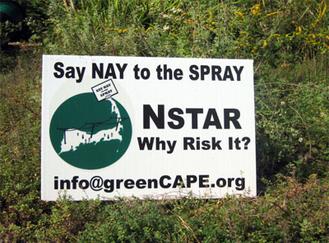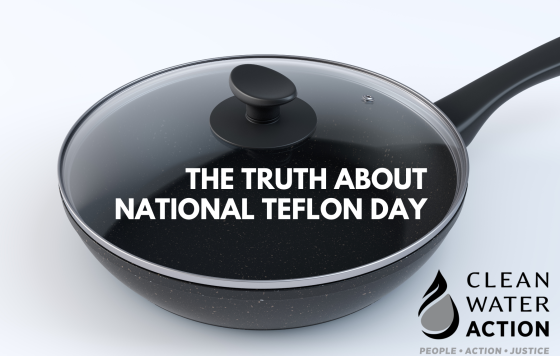
Eversource (and before it NSTAR) has been spraying herbicides on long stretches of its transmission line rights-of-way (ROW) for years at great risk to those in the surrounding areas. These ROWs are close to homes, public spaces, and above an EPA-designated sole-source aquifer. NSTAR/Eversource has been spraying without the consent of those affected by these harmful chemicals, and in violation of state regulations set for them in the Massachusetts Pesticides Control Act (M.G.L. c.132), the Pesticide Board’s rights of way management (333 CMR 11.00), and the Yearly Operational Plans (YOP). There are non-toxic and non-chemical alternatives to the herbicides being used which would pose a much lower risk for the health of the residents of and visitors to Cape Cod.
Because of the unique environment of Cape Cod, resting mainly on sandy soil and clay deposits, anything spilled on the ground is likely to get into the source water below. In addition to chemicals getting into the aquifer, the herbicides can last in the environment for a very long time and cause ill effects even after they’ve left the air, as they are PBTs (persistent, bioaccumulative, and toxic). The herbicides being sprayed by Eversource can be very damaging to the health of residents, tourists, and future generations. Some of the ingredients in the herbicides have been linked to breast cancer as well as endocrine and nervous system disruption. They can also cause permanent changes to one’s genetic code, which can be passed down from generation to generation long after spraying has stopped.
What’s more, the herbicides are are unnecessary, as vegetation in the ROWs is not very dense and can easily be cut back if needed. Another solution, which has been put into use in surrounding areas, is the use of goats to get rid of invasive plants. Goats not only eat the unwanted vegetation, but also create healthier soil in the process by breaking it up and adding fertilizer.
Beyond the role of Eversource, the Massachusetts Department of Agricultural Resources has also been criticized for failing to enforce the regulations it has set. Eversource has been able to get away with a myriad of infractions, such as over spraying, spraying when conditions are not suitable, and disregarding label instructions. With this lack of enforcement, there is little incentive for Eversource to change its ways. As long as spraying is allowed, there must be better enforcement, including repercussions and faster inspections when issues do occur. Eversource should be made to abide by state laws, and held accountable for what they put into the environment.
Cape Cod residents did not give consent and are fighting back against this mistreatment of their land and health by asking for the 2017 Eversource Yearly Operational Plan to be rejected. All 15 Cape towns having signed resolutions in opposition to this use of herbicides and thousands of citizens, including concerned physicians, and hundreds of local businesses have asked Eversource to stop spraying. Organizations such as GreenCAPE, a Cape-based grassroots non-profit, are working towards the goal of eliminating the use of herbicides through petitions as well as public awareness and involvement.
How you can help:
- Sign GreenCAPE’s petition addressed to Eversource CEO, Jim Judge, to reconsider using toxic herbicides. Sign the Petition
- Submit a comment to MA Department of Agricultural Resources Commissioner John Lebeaux urging the DAR to reject Eversource’s 2017 Yearly Operational Plan for Cape Cod which calls for more pesticide spraying. Comments are due by March 27th and can be sent to:
John Lebeaux, Commissioner
MA Department of Agricultural Resources
251 Causeway St, Suite 500
Boston, MA 0211
(For a sample, see Clean Water Action’s comments here).
- If you live on Cape Cod - protest on your land by posting “no trespassing/no spraying without consent of owner” signs, and organizing with your neighbors if spray crews do show up. Also, report any misconduct or over-spraying to the MA Department of Agricultural Resources and MA Attorney General, Maura Healey.



